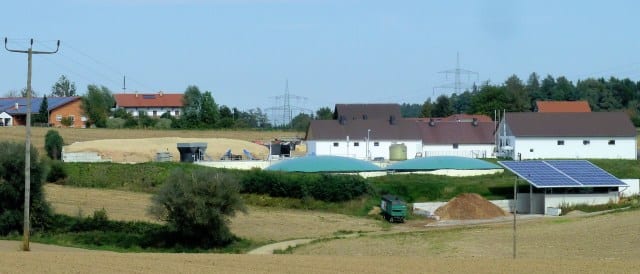We live in an age of quickly changing business models, and the trend is clearly towards Big Box megastores – to the detriment of mom-and-pop shops. But Craig Morris says the energy sector is shaping up to go in the opposite direction.

A tweet I saw last year stays in my mind. A proponent of genetic engineering and nuclear power (common ground: big business) poked fun at opponents of corporations by asking them why they tweet using phones made by large corporations. I didn’t respond, but if I had, I would’ve asked what homegrown cell phone that person should have used.
That got me thinking – maybe some sectors naturally trend towards oligopolies. And if so, are there sectors that trend in the other direction?
The big story in the electricity sector this year is clearly that the business model of conventional utilities has no future. What is the future?
I could wax consultant-ish about utilities still being needed to provide the infrastructure that enables a future of more distributed power, with utilities moving away from profits by the kilowatt-hour towards encouraging efficiency. That’s already being done. In fact, the idea is nothing new.
Utilities are headed in this direction anyway. My question is whether we still need them at all. (Spoiler: I’m not sure.)
What business sector serves as a good metaphor when we say distributed renewables offset conventional power? Maybe the music industry? Sure, a number of shops dominate the online market, but a growing number of independent labels also compete somewhat successfully with the established labels. Artists need major labels less and less; the hardware and software needed to produce quite listenable material costs less than 10,000 euros today. So much quality stuff is being produced today that major labels mainly serve as a filter, a role they may gradually lose to online communities.
Solar panels are also cheap now, and onshore wind is even cheaper. But if the grid is the internet – the enabling infrastructure – to continue our metaphor, that’s still bad news for utilities. From Germany to Australia, the question is whether we are about to witness a mass movement among homeowners away from the grid and towards solar roofs. Not everyone can make that shift; it’s harder for tenants, but also for owners of apartments in complexes, where the roof is shared. But communities can put up their own solar arrays and small wind farms – as opposed to giant projects owned by corporations. Concentrated projects run by corporations focus on sites with the best resources, and the cost of a kilowatt -hour is low. But the profits go back to the corporation, not the community.
Furthermore, grids can be community-owned. The German cities of Berlin and Hamburg recently held plebiscites so that the profits from their local grids would go back into the community, not to the foreign corporation running the grid at the time. (Hamburg voted to take back its grid; Berlin did not.)
Biomass is most profitable in district heat networks. They can be done by municipal utilities; no international conglomerate is needed.
In the energy sector, corporations are mainly needed for international trading: fossil fuels and uranium (while France considers its nuclear power “domestic,” it imports 100 percent of its uranium). Desertec needs international corporations, but otherwise renewable power generally does not.
Maybe our current utilities will provide enabling infrastructure, or maybe they will become insignificantly small players – or disappear. After all, the grid as enabling infrastructure might get smaller, and communities can own the grid and provide other enabling services – storage comes to mind.
In the end, what is at stake in the energy transition is not just a choice between various low-carbon sources of electricity. It is also a choice between 1) corporations promising consumers low energy prices (and you can go to hell if you don’t want the giant project near your home) and 2) local renewables that may look more expensive, but you pay those higher prices back to you and your neighbors – and you have input into what gets built in your community.
We may not get homegrown smartphones anytime soon, but homegrown juiceworks. The push against renewables is also a desperate attempt to protect incumbent firms on a market that might trend away from big business and towards small producers if market forces and democracy prevail. At the same time, the pushback means that the trend towards energy democracy will not happen on its own – we have to fight for it.
Source: Energy Transition. Reproduced with permission.










